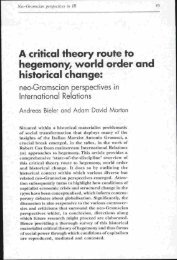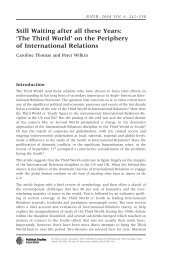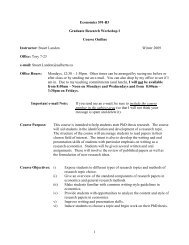Is comparative politics dead? Rethinking the field in the post-Cold ...
Is comparative politics dead? Rethinking the field in the post-Cold ...
Is comparative politics dead? Rethinking the field in the post-Cold ...
You also want an ePaper? Increase the reach of your titles
YUMPU automatically turns print PDFs into web optimized ePapers that Google loves.
HOWARD J WIARDAmore conservative political±economy agenda. At <strong>the</strong> same time, Germany andSpa<strong>in</strong> have right-of-centre governments that have done little to privatise, rollback state size, or curtail social welfare. In o<strong>the</strong>r words, <strong>the</strong> <strong>post</strong>-cold warconsensus on neoliberalism is forc<strong>in</strong>g all governments to coalesce around afairly agreed-upon policy of open<strong>in</strong>g markets and downsis<strong>in</strong>g <strong>the</strong> state but onlymodestly, and also reduc<strong>in</strong>g welfare but also only modestly. All governments ofboth Left and Right are follow<strong>in</strong>g this essentially centrist agenda, pursu<strong>in</strong>g <strong>the</strong><strong>politics</strong> of `more or less’ , and thus alter<strong>in</strong>g both <strong>the</strong>ir electoral strategies and<strong>the</strong>ir search for coalition allies.Sixth, <strong>the</strong>se changes also help expla<strong>in</strong> <strong>the</strong> new emphasis on <strong>in</strong>stitutions(neo-<strong>in</strong>stitutionalism) <strong>in</strong> <strong>comparative</strong> <strong>politics</strong>. The implications of <strong>the</strong> argumentpresented here are that ideologies, party labels, and particularly extremist partiesof Left and Right <strong>in</strong> this new era of relative consensus on political economy arebecom<strong>in</strong>g less important than <strong>in</strong> <strong>the</strong> past. Indeed, it may be that <strong>the</strong> electoralarena itself, when parties and policy are group<strong>in</strong>g around <strong>the</strong> centre and voterapathy is high, is also becom<strong>in</strong>g less important, giv<strong>in</strong>g way to <strong>in</strong>creas<strong>in</strong>glyimportant emphasis on corporatist forms of management and adm<strong>in</strong>istration.With parties, ideologies and perhaps even elections <strong>in</strong> decl<strong>in</strong>e, <strong>the</strong>re is renewedemphasis on <strong>in</strong>stitutions of government, particularly <strong>the</strong> ef® ciency, properorganisation, cost-effectiveness and deliverability of services of <strong>the</strong>se <strong>in</strong>stitutions.Hence, with<strong>in</strong> <strong>comparative</strong> <strong>politics</strong> <strong>the</strong>re is a new <strong>in</strong>terest <strong>in</strong> and emphasison <strong>in</strong>stitutions and <strong>in</strong>stitutionalisation that may, after a 40-year <strong>in</strong>terregnum, leadus back to <strong>the</strong> quite sophisticated work on <strong>in</strong>stitutions of a Carl Friedrich,Herman F<strong>in</strong>er, or Karl Loewenste<strong>in</strong> <strong>in</strong> earlier decades, or Peter Merkl or JorgenRasmussen still today. 40 New approaches to study<strong>in</strong>g <strong>in</strong>stitutions are, of course,needed but of <strong>the</strong> usefulness of <strong>the</strong> <strong>in</strong>stitutional focus itself <strong>the</strong>re is little doubt.However, if <strong>the</strong> state is chang<strong>in</strong>g and/or contract<strong>in</strong>g, seventh, we will need tomodify our views of state±society relations as well. The structure, ma<strong>in</strong> <strong>in</strong>stitutions,and practice of corporatism and neocorporatism will also need to bereviewed and our <strong>in</strong>terpretations reformulated. Similarly, <strong>the</strong> <strong>politics</strong> of <strong>in</strong>terestgroup activity, particularly <strong>the</strong> <strong>in</strong>corporation of <strong>in</strong>terest groups <strong>in</strong>to state decisionmak<strong>in</strong>g, will require new approaches and new ways of th<strong>in</strong>k<strong>in</strong>g. 41 In addition,<strong>the</strong> relations between <strong>the</strong> central state, regional entities, and local governmentwill need to be re-evaluated, particularly s<strong>in</strong>ce decentralisation is now widelyseen as a more effective way to deliver public servicesÐ back to <strong>in</strong>stitutionalissues aga<strong>in</strong>.Eighth, <strong>comparative</strong> <strong>politics</strong> is also likely to focus <strong>in</strong> <strong>the</strong> future on lower-level,more technical, narrower and more specialised topics. These will <strong>in</strong>clude studiesof vot<strong>in</strong>g behaviour, public op<strong>in</strong>ion, electoral strategies and coalition management.These are, of course, all <strong>in</strong>terest<strong>in</strong>g and worthwhile topics; it is not ourpurpose here to denigrate <strong>the</strong>m. But <strong>the</strong>se topics do not carry <strong>the</strong> same pizazz,<strong>the</strong> excitement, or <strong>the</strong> portent of great changes to come as did <strong>the</strong> great systemstopics of <strong>comparative</strong> <strong>politics</strong> <strong>in</strong> <strong>the</strong> past. And that is precisely our po<strong>in</strong>t <strong>in</strong> thisessay.ConclusionComparative <strong>politics</strong> is a quite different ® eld from what it was 10, 20, 30 and946
















